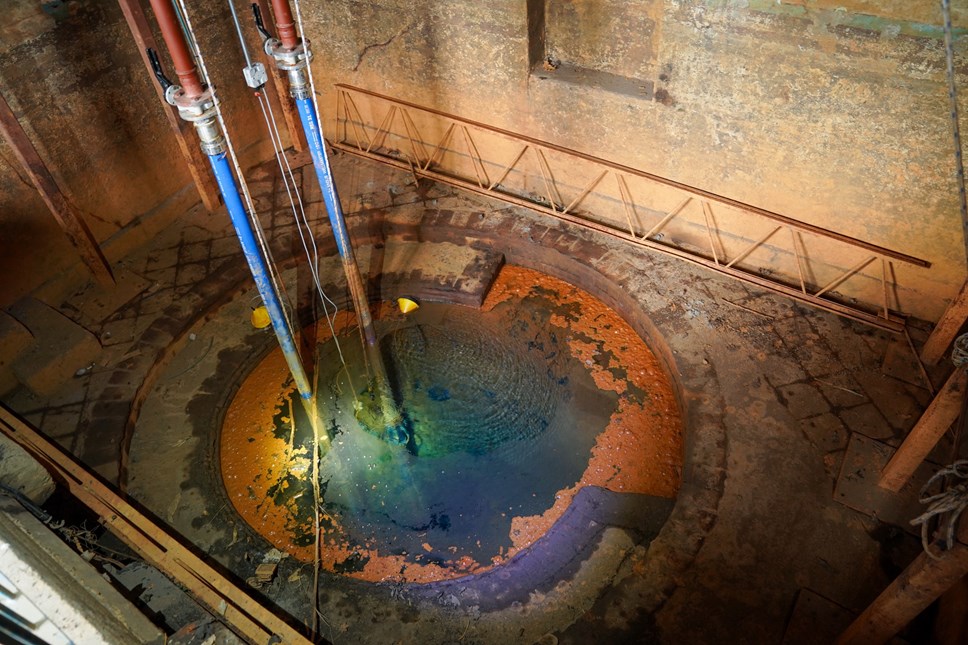
A legacy that lives on: Welsh coal mines key to the industrial revolution could heat homes of the future
Etifeddiaeth sy'n goroesi: Gallai pyllau glo Cymru oedd yn allweddol i'r chwyldro diwydiannol wresogi cartrefi'r dyfodol
A £450,000 project will explore whether water from disused mines has the potential to play a vital role in supplying Wales’ energy needs for years to come.
Wales’ mines were crucial in firing up the industrial revolution, but once abandoned, the pumps that kept them dry were often switched off and the mines filled with water.
Climate Change Minister Julie James has confirmed the funding would allow the Coal Authority to investigate whether this water, which is heated by geological processes, could be used to heat homes, businesses and industry across Wales.
Sites will be mapped to give a high-level assessment of where the best potential lies, with more detailed feasibility studies carried out on those considered to have the most realistic likelihood to connect to existing buildings and new developments.
Approximately 40% of the energy used in Wales provides heat to homes, businesses and our industry.
Most of this heat comes from gas, but by 2025, there will be no gas connections in new build homes in Wales to support decarbonisation efforts.
Mine water is a low carbon, sustainable heat source, which could compete with public supply gas prices and deliver carbon savings of up to 75% compared to gas heating.
The Minister said:
“Improving the energy efficiency of homes is essential as we front up to the climate emergency and build a stronger, greener and fairer Wales.
“To get there, we need to think innovatively and ensure we meet out renewable energy needs of the future, so I’m looking forward to hearing what the Coal Authority discover as part of their work.
“It’s very exciting that communities could be metres from a technology-ready alternative to traditional heating methods that could help us towards our journey to a Net Zero Wales by 2050.”
The Welsh Government has bold ambitions to see the entire public sector carbon neutral by 2030, and it is believed heat from mine water could provide such bodies an alternative solution to their current heating supply.
Any identified opportunities for mine water heating also have the potential to breathe life back into communities, as well as create a wealth of benefits for the economy – including jobs and manufacturing.
In Taff’s Well, the natural flow of warm water from Wales’ only thermal spring is providing heating to the nearby park pavilion and the local primary school – which is similar to how a mine water system could work.
Cllr. Tina Leyshon, Cabinet Member for Climate Change and Corporate Services, Rhondda Cynon Taf County Borough Council said:
“We’re excited at the possibility that this same type of technology may be used to capture heat also found in the flooded mines across south Wales, so deep they are also heated by geological processes.
“Our aim is to be a carbon neutral council by 2030, and for the county borough to be as close as possible to carbon neutral as we can get by then. Pursuing new technologies to ensure a just transition is a key part of this.
“The Taff’s Well Thermal Spring Project is one we’re very proud of. The project to explore the potential for this technology across the mines network will hopefully play an important part in ensuring the long-term energy security of our communities.”
Gareth Farr, Head of Heat and By-Product Innovation at the Coal Authority added:
“Mine water from disused coal mines can be used to support heat networks, providing secure, low carbon heat to buildings.
“We look forward to working with the Welsh Government on this first of a kind project to highlight the opportunity for such technology, creating a green future for Wales’ former coalmining areas.”
Notes to editors
Welsh Government is already exploring and implementing solutions for decarbonising heat in residential buildings, including the Optimised Retrofit Programme and Warm Homes programme and has committed to further work as part of Net Zero Wales.
There have already been several small pilot schemes that have proved this concept in the UK, with significant development in the North East of England, where Gateshead Council hope to commission its 3MW mine water heat network in mid-2022.
